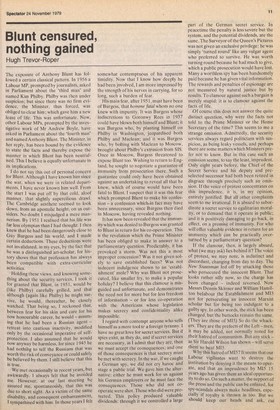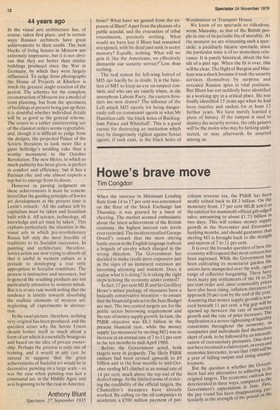Blunt censured, nothing gained
Hugh Trevor-Roper
The exposure of Anthony Blunt has followed a certain classical pattern. In 1 956 a Labour MP, prompted by journalists, asked in Parliament about the 'third man' and named Kim Philby, Philby was then under suspicion; but since there was no firm evi dence, the Minister, thus forced, was obliged to clear him; which gave him a new lease of life. This was unfortunate. Now, other Labour MPs, prompted by the inves tigative work of Mr Andrew Boyle, have asked in Parliament about the 'fourth man' and named Anthony Blunt. The Minister, in her reply, has been bound by the evidence to state the facts and thereby expose the manner in which Blunt has been neutral ised. This I believe is equally unfortunate in its implications..
I do not say this out of personal concern tor Blunt. Although I have known him since the war, when we were in related depart' ments, I have never known him well. From the start I was put off by that cold, aloof manner, that slightly supercilious drawl. The Cambridge aesthete seemed to look down, from an apostolic height, on us outsiders. No doubt I misjudged a mere mannerism. By 1951 1 realised that his life was tar less olympian than I had thought. I then knew that he had been dangerously close to Guy Burgess and his world, and I made certain deductions. These deductions were not invalidated, in my eyes, by the fact that he was a distinguished art-scholar, for history shows that that profession has always been compatible with extra-curricular activities.
Holding these views, and knowing something about the security services, I took it for granted that Blunt, in 1951, would be (like Philby) carefully grilled, and that although (again like Philby) he might survive, he would, thereafter, be closely watched. That being so, I reckoned that, between fear for his skin and care for his now honourable career, he would — assuming that he had been a Russian agent — retreat into cautious inactivity, modified only by the occasional imperative of selfprotection. I also assumed that he would now anyway be harmless, for since 1 945 he had nothing to tell the Russians that was worth the risk of conveyance or could safely be believed by them. I still believe that this is true.
We met occasionally in recent years, but awkwardly. I always felt that he avoided me. However, at our last meeting he • assured me. spontaneously, that this was due to short sight. As a victim of the same disability, and consequent embarrassment, I sympathised with him. In those years I felt somewhat contemptuous of his apparent timidity. Now that I know how deeply he had been involved, I am more impressed by the strength of his nerves in carrying, for so long, such a burden of fear.
His main fear, after 1 951, must have been of Burgess, that homme fatal whom no one knew with impunity. It was Burgess whose indiscretions to Goronwy Rees in 1 937 could have blown both himself and Blunt; it was Burgess who, by planting himself on Philby in Washington, jeopardised both Philby and Maclean; and it was Burgess who, by bolting with Maclean to Moscow, brought about Philby's extrusion from SIS. Once in Moscow, Burgess threatened to expose Blunt too. Wishing to return to England, he sought to negotiate a guarantee of immunity from prosecution there. Such a guarantee could only have been obtained against an undertaking to reveal all that he knew, which of course would have been fatal to Blunt. I suspect that it was this fear which prompted Blunt to make his confession — a confession which in fact may have been unnecessary, since Burgess then died in Moscow, having revealed nothing.
It has now been revealed that the immunity which was denied to Burgess was granted to Blunt in return for his co-operation. This is the revelation which the Prime Minister has been obliged to make in answer to a parliamentary question. Predictably, it has provoked a storm. Was not this a most improper concession? Was it not given solely to save established faces? Was not indecent indulgence shown to an 'establishment' mole? Why was Blunt not prosecuted, like smaller fry, to make a popular holiday? I believe that this clamour is misguided and unfortunate, and demonstrates the need not for more but for less freedom of information — or for less co-operation with the Americans whose legislation makes secrecy and confidentiality alike impossible. I regard with contempt anyone who sells himself as a mere tool tc a foreign tyranny. I have no great love for secret services. But if spies exist, as they do, and if secret services are necessary, as I admit that they are, then we must accept the consequences; and one of those consequences is that secrecy must be met with secrecy. In the war, if we caught a German spy, we did not cry havoc and stage a public trial. We gave him the alternative: either he must work for us against his German employers or he must face the consequences. Those who did not cooperate were shot. Those who did were protected. This policy produced valuable dividends: through it we controlled a large part of the German secret service. In peacetime the penalty is less severe but the system, and the potential dividends, are the same. The Surveyor of the Queen's Pictures was not given an exclusive privilege: he was simply 'turned round' like any vulgar agent who preferred to survive. He was worth turning round because he had much to give, which a public prosecution would have lost. Many a worthless spy has been handsomely paid because he has given vital information. The rewards and penalties of espionage are not measured by natural justice but by results. To clamour against such a bargain is merely stupid: it is to clamour against the facts of life.
Of course this does not answer the quite distinct question, why were the facts not told to the Prime Minister or the Home Secretary of the time? This seems to me a strange omission. Admittedly, the security services always regard politicians with suspicion, as being leaky vessels, and perhaps there are some matters which Ministers prefer not to know. But in this case such an omission seems, to say the least, imprudent. Only eight years before, the Chief of the Secret Service and his deputy and preselected successor had both been retired in disgrace through precisely such an omission. If the voice of protest concentrates on this imprudence, it is, in my Opinion, entirely justified. But all other complaints seem to me irrational. It is absurd to subordinate a secret service to egalitarian morality, or to demand that it operate in public; and it is positiveiy damaging to go back, in effect, on a promise of immunity. For who will offer valuable evidence in return for an immunity which can be practically overturned by a parliamentary question?
If the clamour, then, is largely absurd, what (we my ask) lies behind it? The voice of protest, we may note, is indistinct and discordant, changing from day to day. The New Statesman led off by attacking those who persecuted the innocent Blunt. That looks rather silly now, so the charge has been changed — indeed reversed. Now Messrs Dennis Skinner and William Hamilton belabour the Establishment and MI5 not for persecuting an innocent Marxist scholar but for being too indulgent to a guilty spy. In other words, the stick has been changed, but the buttocks remain the same. (They are those of MI5.). So do the whackers. They are the prefects of the Left — men, it may be added, not normally noted for their hatred of communism. But any stick — as Sir Harold Wilson has shown —will serve them to beat MI5.
Why this hatred of MI5? It seems that our Labour vigilantes want to destroy the institution by denying it the means to operate, and that an imprudence by MI5 15 years ago has given them an ideal opportunity to do so. On such a matter, the support of the press and the public can be enlisted, for spy-scandals always make headlines, especially if royalty is thrown in too. But we should keep our heads and ask, cui bono? What have we gained from the exposure of Blunt? Apart from the pleasure of a public scandal, and the evacuation of tribal resentments, precisely nothing. What would we have lost if Blunt had remained unexposed, with his dead past sunk in secret memory? Equally, nothing. What will we gain if, like the Americans, we effectively dismantle our security service? Less than nothing.
The real reason for left-wing hatred of MIS can hardly be in doubt. It is the function of MIS to keep an eye on suspect contacts, and who can say exactly where, in the amorphous Labour Party, the eastern frontiers are now drawn? The tribunes of the Left attack MI5 openly for being dangerously soft on communist agents in what Mr Hamilton calls 'the black holes of Buckingham Palace and Whitehall'. This is a good excuse for destroying an institution which may be dangerously vigilant against Soviet agents, if such exist, in the black holes of Westminster or Transport House.
We know of no spectacle so ridiculous, wrote Macaulay, as that of the British people in one of its periodic fits of morality. At the moment we are witnessing such a spectacle: a peculiarly bizarre spectacle, since the particular issue is of no immediate relevance. It is purely historical, about the fossils of a past age. When the fit is over, this will be clear. The flight of Burgess and Maclean was a shock because it took the security services themselves by surprise and revealed Russian spies in vital positions. But Blunt has not suddenly been identified as a working spy in a critical place. He was finally identified 15 years ago when he had been inactive and useless for at least 13 further years. We have merely learned a piece of history. If the rumpus is used to destroy the security service, the only gainers will be the moles who may be lurking undetected, or may afterwards be inserted among us.



































 Previous page
Previous page